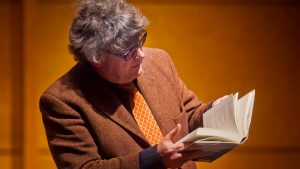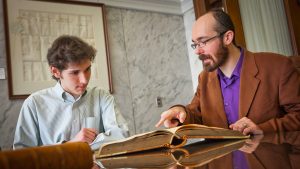The Literature Concentration
At Lafayette College, students in English learn to respond thoughtfully and critically to texts from across the English-speaking world and to articulate their responses in clear and fluent language.

Pulitzer Prize-winning poet Paul Muldoon was featured in a H. MacKnight Black Poetry Reading held at Lafayette College.
Studying English doesn’t just mean encounters with Shakespeare and Austen and Frost. We are committed not only to British and American literature but also to an ever-expanding horizon of inquiry, including African-American literature, Irish literature, and Caribbean literature, and to works in all genres. Some of our courses are informed by a particular theoretical perspective, such as performance theory, queer theory, post-colonial theory, media studies, or visual studies. Exposure to this broad range helps students draw distinctions and make connections among what they encounter in the pages of books, in their own writing, and in their personal experience.

Professor of English Chris Phillips (in brown sports coat), works with EXCEL scholar Gavin Jones ’14, doing research in digitizing the hand-written circulation records of the Easton Library Company from 1811-1862. This research area is called the “history of reading.”
Lafayette’s English faculty is composed of dedicated scholars whose individual research interests help create a dynamic, give-and-take experience in the classroom. An active, creative faculty makes for interesting discussions, readings, and writing assignments. Moreover, contemporary writers across the genres visit our classes, give special readings or talks, and generously share their work with us. In recent years, Lafayette has hosted the likes of George Saunders, Dave Eggers, Maxine Clair, Paul Muldoon, Wole Soyinka, Toni Morrison, Jay Parini, John Updike, Julia Alvarez, Sherman Alexie, Peter Carey, Art Spiegelman, Tony Kushner, and Sam Lipsyte.
The department keenly understands the importance of training students to read the cultures of other times and places. Our students, by engaging their critical faculties with texts that span genres, styles, regions, and periods, gain a linguistic and cultural versatility valuable for law, entrepreneurship, and professional leadership. Our literature curriculum helps prepare students for postgraduate work in English and related fields, for advanced work in professional and business schools, and for careers in government and non-governmental organizations (NGOs).